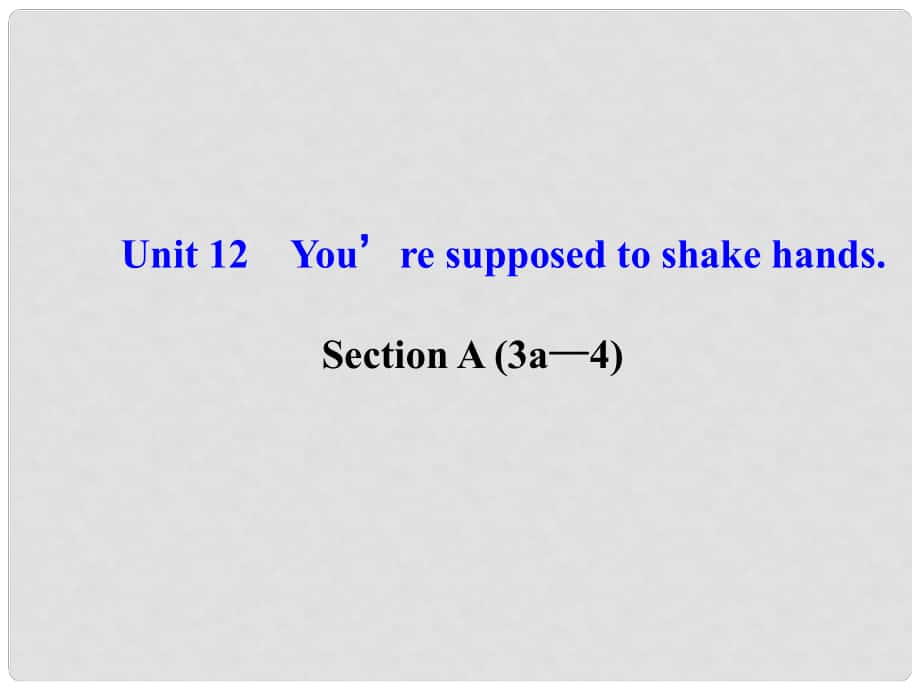《九年級(jí)英語(yǔ)全冊(cè) Unit 12 You’re supposed to shake hands Section A(3a—4)課件 人教新目標(biāo)版》由會(huì)員分享�,可在線(xiàn)閱讀,更多相關(guān)《九年級(jí)英語(yǔ)全冊(cè) Unit 12 You’re supposed to shake hands Section A(3a—4)課件 人教新目標(biāo)版(18頁(yè)珍藏版)》請(qǐng)?jiān)谘b配圖網(wǎng)上搜索��。
1���、 Unit 12Youre supposed to shake hands. Section A (3a4) . 短語(yǔ)互譯短語(yǔ)互譯1. 順便順便(或偶然或偶然)拜訪(fǎng)拜訪(fǎng)by2. 制訂計(jì)劃制訂計(jì)劃 plans3. 準(zhǔn)時(shí)準(zhǔn)時(shí) time4. 畢竟畢竟; 終究終究; 究竟究竟 after 5. have to 6. get angry 答案答案: 1. drop2. make3. on4. all5. 必須必須; 不得不不得不6. 生氣生氣; 發(fā)怒發(fā)怒. 句型展示句型展示1. 在我們那兒在我們那兒, 對(duì)時(shí)間的要求相當(dāng)寬松。對(duì)時(shí)間的要求相當(dāng)寬松�����。Where Im from, were pretty_ _
2��、time. 2. 對(duì)我們來(lái)說(shuō)對(duì)我們來(lái)說(shuō), 和家人����、朋友們一起共度時(shí)光是很重要的。和家人��、朋友們一起共度時(shí)光是很重要的����。_time with family and friends _ very important to us.答案答案: 1. relaxed about2. Spending; is3. 在瑞士在瑞士, 守時(shí)是很重要的。守時(shí)是很重要的����。In Switzerland, _ very important_ _ on time. 4. 假如有人約你四點(diǎn)見(jiàn)面假如有人約你四點(diǎn)見(jiàn)面, 你就必須四點(diǎn)鐘到那里��。你就必須四點(diǎn)鐘到那里����。If someone _ you _ meet them at
3�、4: 00, you_ _ be there at 4: 00. 5. 我們通常計(jì)劃一起去做一些有趣的事情或一起去某個(gè)地方。我們通常計(jì)劃一起去做一些有趣的事情或一起去某個(gè)地方���。We usually plan _ _ something interesting, or go somewhere together. 答案答案: 3. its; to be4. invites; to; have to5. to do1. Where Im from, were pretty relaxed about time. 在我們那兒在我們那兒, 對(duì)時(shí)間的要求相當(dāng)寬松���。對(duì)時(shí)間的要求相當(dāng)寬松?�!咀灾黝I(lǐng)悟】【自主
4�、領(lǐng)悟】(1)Where Im from是地點(diǎn)狀語(yǔ)從句是地點(diǎn)狀語(yǔ)從句, 相當(dāng)于相當(dāng)于in/at/to+the place+where從句從句, 意為意為“在在地方地方”。(2)be relaxed about意為意為“對(duì)對(duì)隨意隨意; 對(duì)對(duì)寬松寬松”, 后可接名后可接名詞�����、代詞或詞�、代詞或_形式。形式。動(dòng)詞動(dòng)詞-ing【用法辨析】【用法辨析】你會(huì)正確你會(huì)正確“放松放松”嗎嗎? 詞匯詞匯詞性詞性用法用法relax動(dòng)詞動(dòng)詞意為意為“放松放松; 休息休息”, 其現(xiàn)在分詞形式是其現(xiàn)在分詞形式是relaxing, 過(guò)去式����、過(guò)去分詞形式是過(guò)去式、過(guò)去分詞形式是relaxedrelaxed形容詞形容詞意為意為“
5��、放松的放松的; 寬松的寬松的; 輕松自在的輕松自在的”, 用來(lái)修飾��、說(shuō)明人的情感狀態(tài)用來(lái)修飾�����、說(shuō)明人的情感狀態(tài)relaxing形容詞形容詞意為意為“令人輕松的令人輕松的”, 用來(lái)修飾���、說(shuō)明用來(lái)修飾、說(shuō)明事物的特征事物的特征【一言辨異】【一言辨異】We can _ ourselves and feel really _ by taking a _ trip. 通過(guò)輕松愉快的旅行通過(guò)輕松愉快的旅行, 我們可以放松自己并使自己真正感到放我們可以放松自己并使自己真正感到放松��。松��。relaxrelaxedrelaxing【活學(xué)活用】【活學(xué)活用】 用用relax/relaxing/relaxed填空���。填空
6����、���。a. Listening to music always makes me. b. Its necessary to learn how to. c. We had a verytime during the vacation. 答案答案: a. relaxedb. relaxc. relaxinghe comes from, people make a living by fishing. A. WhatB. WhereC. WhenD. How2. We often just drop by our friends homes. 我們經(jīng)常只是順便到朋友家拜訪(fǎng)���。我們經(jīng)常只是順便到朋友家拜訪(fǎng)
7��、����?����!咀灾黝I(lǐng)悟】【自主領(lǐng)悟】drop by意為意為“順便順便(或偶然或偶然)拜訪(fǎng)拜訪(fǎng)”, 后常接表示后常接表示_的名詞����。例如的名詞。例如: She often drops by her neighbors homes. 她經(jīng)常去拜訪(fǎng)她的鄰居��。她經(jīng)常去拜訪(fǎng)她的鄰居�����。地點(diǎn)地點(diǎn)【歸納拓展】【歸納拓展】drop in的相關(guān)搭配的相關(guān)搭配drop in 順便拜訪(fǎng)某人順便拜訪(fǎng)某人/某地某地 +_+某人某人 +_+某地某地onat【活學(xué)活用】【活學(xué)活用】如果我有空的話(huà)如果我有空的話(huà), 我就去拜訪(fǎng)你�����。我就去拜訪(fǎng)你。Ill drop in _ _ if I am free. 隨時(shí)歡迎你來(lái)拜訪(fǎng)�����。隨時(shí)歡迎你來(lái)拜訪(fǎng)��。Y
8�����、ou can _ _ _ my house at any time. 昨天我去拜訪(fǎng)你昨天我去拜訪(fǎng)你, 你不在家�����。你不在家����。I _ _ your home yesterday, but you werent in. 答案答案: on youdrop in atdropped by3. Often we just walk around the town center, seeing as many of our friends as we can! 我們常常只是在市中心走動(dòng)我們常常只是在市中心走動(dòng), 盡可能盡可能多地見(jiàn)見(jiàn)我們的朋友們多地見(jiàn)見(jiàn)我們的朋友們! 【自主領(lǐng)悟】【自主領(lǐng)悟】(1)seein
9�、g as many of our friends as we can是現(xiàn)在分詞短語(yǔ)是現(xiàn)在分詞短語(yǔ), 在在句中作狀語(yǔ)。句中作狀語(yǔ)�。(2)as. . . as one can相當(dāng)于相當(dāng)于as. . . as possible, 意為意為“盡可能盡可能”。as. . . as中間要用形容詞或副詞的中間要用形容詞或副詞的_���。原級(jí)原級(jí)【歸納拓展】【歸納拓展】現(xiàn)在分詞短語(yǔ)作狀語(yǔ)現(xiàn)在分詞短語(yǔ)作狀語(yǔ)(1)主語(yǔ)一致主語(yǔ)一致: 現(xiàn)在分詞現(xiàn)在分詞(短語(yǔ)短語(yǔ))作狀語(yǔ)時(shí)作狀語(yǔ)時(shí), 它的邏輯主語(yǔ)與句子它的邏輯主語(yǔ)與句子的主語(yǔ)要一致的主語(yǔ)要一致, 且與句子主語(yǔ)為且與句子主語(yǔ)為_(kāi)��。例如��。例如: Walking in the
10��、park, she met an old friend. (=While she was walking in the park, she met an old friend. )在公園里散步時(shí)在公園里散步時(shí), 她遇見(jiàn)了一位老朋友���。她遇見(jiàn)了一位老朋友����。(2)句法作用句法作用: 現(xiàn)在分詞現(xiàn)在分詞(短語(yǔ)短語(yǔ))常在句中作狀語(yǔ)常在句中作狀語(yǔ), 表示目的�����、條表示目的�、條件、原因����、結(jié)果、讓步����、伴隨等��。件�����、原因��、結(jié)果��、讓步�、伴隨等��。(3)否定結(jié)構(gòu)否定結(jié)構(gòu): 直接在現(xiàn)在分詞直接在現(xiàn)在分詞(短語(yǔ)短語(yǔ))前加前加_�。主動(dòng)關(guān)系主動(dòng)關(guān)系not【活學(xué)活用】【活學(xué)活用】同義句轉(zhuǎn)換。同義句轉(zhuǎn)換�����。Bill lay on the
11���、 beach, and he was staring at the sky. Bill lay on the beach, _ _the sky. The man didnt know the way to the airport, so he asked the policeman for help. _ _ the way to the airport, the man asked the policeman for help. I hope I can go back to my hometown as soon as possible. I hope I can go back to
12、my hometown as soon as _ _. 答案答案: staring atNot knowingI can. 單項(xiàng)選擇單項(xiàng)選擇1. Its bad for your health to go to school or work withoutbreakfast. A. haveB. to haveC. hadD. having2. Could I use your CD player? Sure. But you are supposed to give it back to me. A. as soon as possible B. as sooner as possibleC
13���、. as quick as possible D. as quicker as possible3. I like to dowith my friends on weekends. A. interesting something B. something interestingC. interesting anything D. anything interesting4. Jimmy plansaround the world after he graduates. A. travel B. travelingC. traveled D. to travel5. the teacher
14��、coming into the classroom, the students stopped talking at once. A. See B. Sees C. Seeing D. Saw. 完成句子完成句子1. 他們正在制訂假期計(jì)劃����。他們正在制訂假期計(jì)劃。They are_ _for vacation. 2. 瑪麗的朋友常順便去她家拜訪(fǎng)?�,旣惖呐笥殉m槺闳ニ野菰L(fǎng)�。Marys friends often _ _ her house. 3. 別再生氣了。畢竟別再生氣了���。畢竟, 他只是個(gè)孩子��。他只是個(gè)孩子���。Dont be angry any more. _ _, he is only a child. 答案答案: 1. making plans2. drop by3. After all4. 事實(shí)上事實(shí)上, 和家人在巴黎度過(guò)他們的假期是很有趣的。和家人在巴黎度過(guò)他們的假期是很有趣的�。In fact, _ their vacation in Paris with family_ very interesting. 5. 請(qǐng)記住請(qǐng)記住: 守時(shí)很重要。守時(shí)很重要��。Please rememberits very important_ _ on time. 答案答案: 4. spending; is5. to be
 九年級(jí)英語(yǔ)全冊(cè) Unit 12 You’re supposed to shake hands Section A(3a—4)課件 人教新目標(biāo)版
九年級(jí)英語(yǔ)全冊(cè) Unit 12 You’re supposed to shake hands Section A(3a—4)課件 人教新目標(biāo)版

